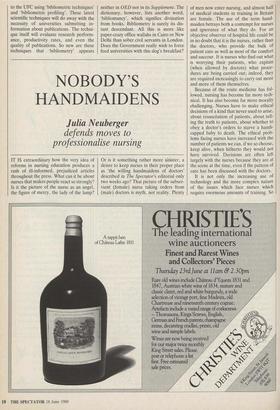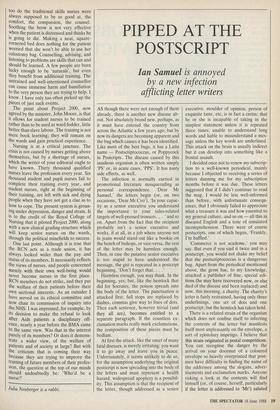NOBODY'S HANDMAIDENS
Julia Neuberger defends moves to professionalise nursing
IT IS extraordinary how the very idea of reforms in nursing education produces a rash of ill-informed, prejudiced articles throughout the press. What can it be about nurses that makes people react so strongly? Is it the picture of the nurse as an angel, the figure of mercy, the lady of the lamp? Or is it something rather more sinister, a desire to keep nurses in their proper place as 'the willing handmaidens of doctors' described in The Spectator's editorial only two weeks ago? That picture of the subser- vient (female) nurse taking orders from (male) doctors is myth, not reality. Plenty of men now enter nursing, and almost half of medical students in training in Britain are female. The use of the term hand- maiden betrays both a contempt for nurses and ignorance of what they do. For an objective observer of hospital life could be in no doubt that it is the nurses, rather than the doctors, who provide the bulk of patient care as well as most of the comfort and succour. It is nurses who find out what is worrying their patients, who explain (when allowed by doctors) what proce- dures are being carried out; indeed, they are required increasingly to carry out more and more of them themselves.
Because of the route medicine has fol- lowed, nursing has become far more tech- nical. It has also become far more morally challenging. Nurses have to make ethical decisions of a kind that never used to arise, about resuscitation of patients, about tell- ing the truth to patients, about whether to obey a doctor's orders to starve a handi- capped baby to death. The ethical prob- lems facing nurses have increased with the number of patients we can, if we so choose, keep alive, when hitherto they would not have survived. Decisions are often left largely with the nurses because they are at the scene at the time, even if the pattern of care has been discussed with the doctors.
It is not only the increasing use of technology and the more complex nature of the issues which face nurses which require enormous amounts of training. So too do the traditional skills nurses were always supposed to be so good at, the comfort, the compassion, the counsel. Soothing the brow is not very effective when the patient is distressed and thinks he is going to die. Making a neat, square- cornered bed does nothing for the patient worried that she won't be able to use her colostomy bag. Counselling, advising, and listening to problems are skills that can and should be learned. A few people are born lucky enough to be 'naturals', but even they benefit from additional training. The untrained and well-intentioned counsellor can cause immense harm and humiliation to the very person they are trying to help. I know. I have only too often picked up the pieces of just such events.
The point about Project 2000, now agreed by the minister, John Moore, is that it allows for student nurses to be trained rather than to be used as ward fodder, little better than slave labour. The training is not mere book learning; they will remain on the wards and gain practical experience.
Nursing is at a critical juncture. The crisis is not caused by nurses getting above themselves, but by a shortage of nurses, which the writer of your editorial ought to have known. Thirty thousand qualified nurses leave the profession every year. Six thousand student and pupil nurses fail to complete their training every year, and student nurses, right at the beginning of their training, are left with sick and dying People when they have not got a clue as to how to cope. The present system is groan- ing under depression, danger and strain. It is to the credit of the Royal College of Nursing that it piloted Project 2000, along with a new clinical grading structure which will keep senior nurses on the wards, through the political minefields to success.
One last point. Although it is true that the RCN acts as a trade union, it has always looked wider than the pay and status of its members. It necessarily reflects the views of nurses, and people concerned merely with their own well-being would never become nurses in the first place. RCN members do not strike, and they put the welfare of their patients before their own sectional interests. As an outsider I have served on its ethical committee and now chair its commission of inquiry into the NHS. I was impressed, for example, by its decision to make the refusal to look after Aids patients a disciplinary off- ence, nearly a year before the BMA came to the same view. Was that in the interest purely of its members? Or does it demons- trate a wider view, of the welfare of patients and of society at large? But with the criticism that is coming their way because they are trying to improve the training of future members of their profes- sion, the question at the top of our minds should undoubtedly be: 'Who'd be a nurse?'
Julia Neuberger is a rabbi.



















































 Previous page
Previous page